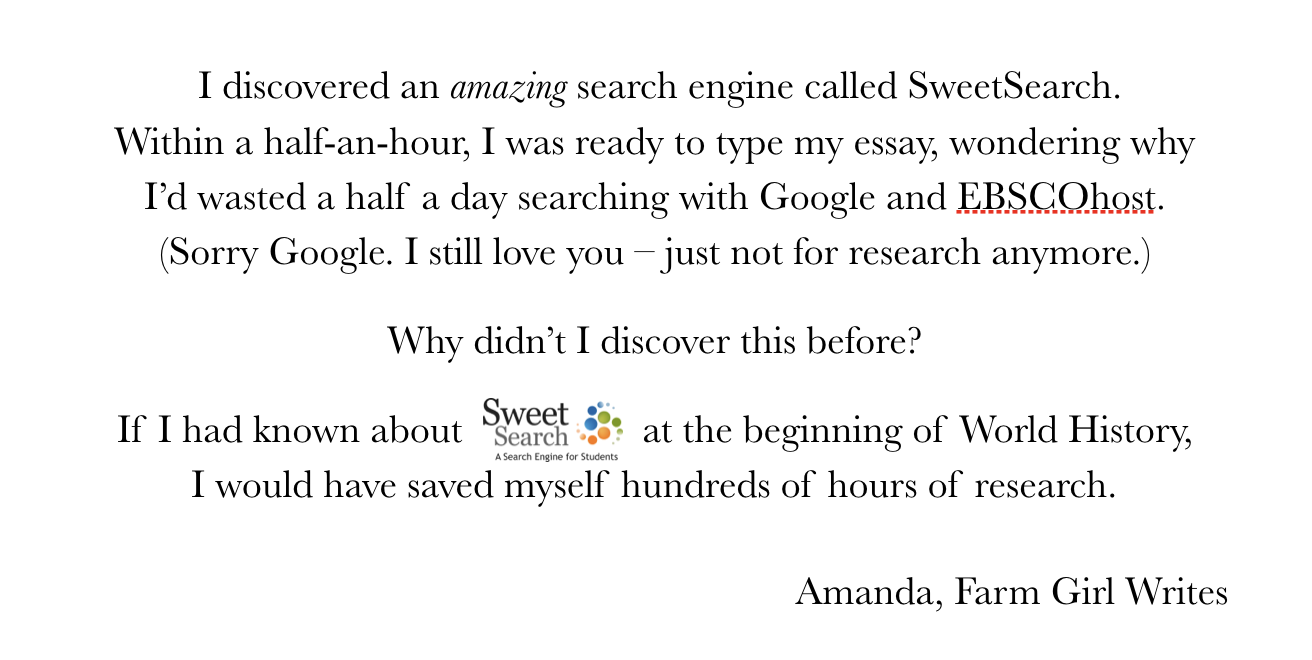Since 2009, SweetSearch has been the best place for students, educators, and anyone else to begin research. It leverages Google to search only a fully vetted “whitelist” of websites. The original index was created by 50+ librarians, educators and researchers who collectively invested over 100,000 hours in finding the best resources.
We’ve worked hard to keep the index authoritative and appropriate. We exclude not only the obviously poor sites; we also exclude marginal sites that read well, but lack academic or journalistic rigor, and thus are not cite-worthy. This summer, we reviewed every link in the index, and found new, worthy websites we had missed.
As technology journalist Paul Gilster wrote in his column in The News Observer,
“Search here and you’re working in a universe of checked, verifiable sources and solid information…..Google or Bing may find many of the same sites, but what I’ve noticed is that some of the better sites for a particular topic wind up deep in their search results, often outranked by Web pages more commonly used but of inferior quality…I was impressed with SweetSearch’s focus on credible scholarship and emphasis on primary source materials.”
The result? Students find what they need, and they find it faster. When my generation was in school, the librarian pointed us to pre-screened resources on our general subject, and we decided which ones were the most relevant to our specific research project. That’s what SweetSearch does for students with online resources.
Amanda, a student who blogs as “FarmGirlWrites,” describes the results the first time she used SweetSearch:
 Once we made SweetSearch better than ever, we decided to make more of it!
Once we made SweetSearch better than ever, we decided to make more of it!
- SweetSearch History, searches a whitelist of 2,000+ primary source & other authoritative history websites. It includes “modern” sources, such as newspapers and magazines, but weight primary sources and websites of museums, universities and official sources higher.
- With all the talk of “fake news,” we also created SweetSearch News. It searches 1,600+ websites of credible newspapers, magazines and other current events media. It more heavily weights niche, regional and ex-US resources than most news search engines. There is an option to see only ex-US resources.
- For the first time, we also offer image search, in all three search engines.
All of our search engines include quality websites for younger students. A good way to find them is to use “students” or “kids” as a keyword.
Of course, students still need to follow the principles laid out in our Ten Steps to Better Web Research by, among other things, formulating good search queries, and often looking past the first few results to find the very best ones. Another principle is to use multiple search tools for every research project, just as professional researchers do.
Watch the two videos below that compare the results from SweetSearch History vs those of Google.
We’d love to get your feedback on SweetSearch, SweetSearch History and SweetSearch News. Try your own searches and let us know what you think by e-mailing info @ SweetSearch.com. We work hard every day to make the best search engines for students even better.
Mark Moran
Founder and CEO






